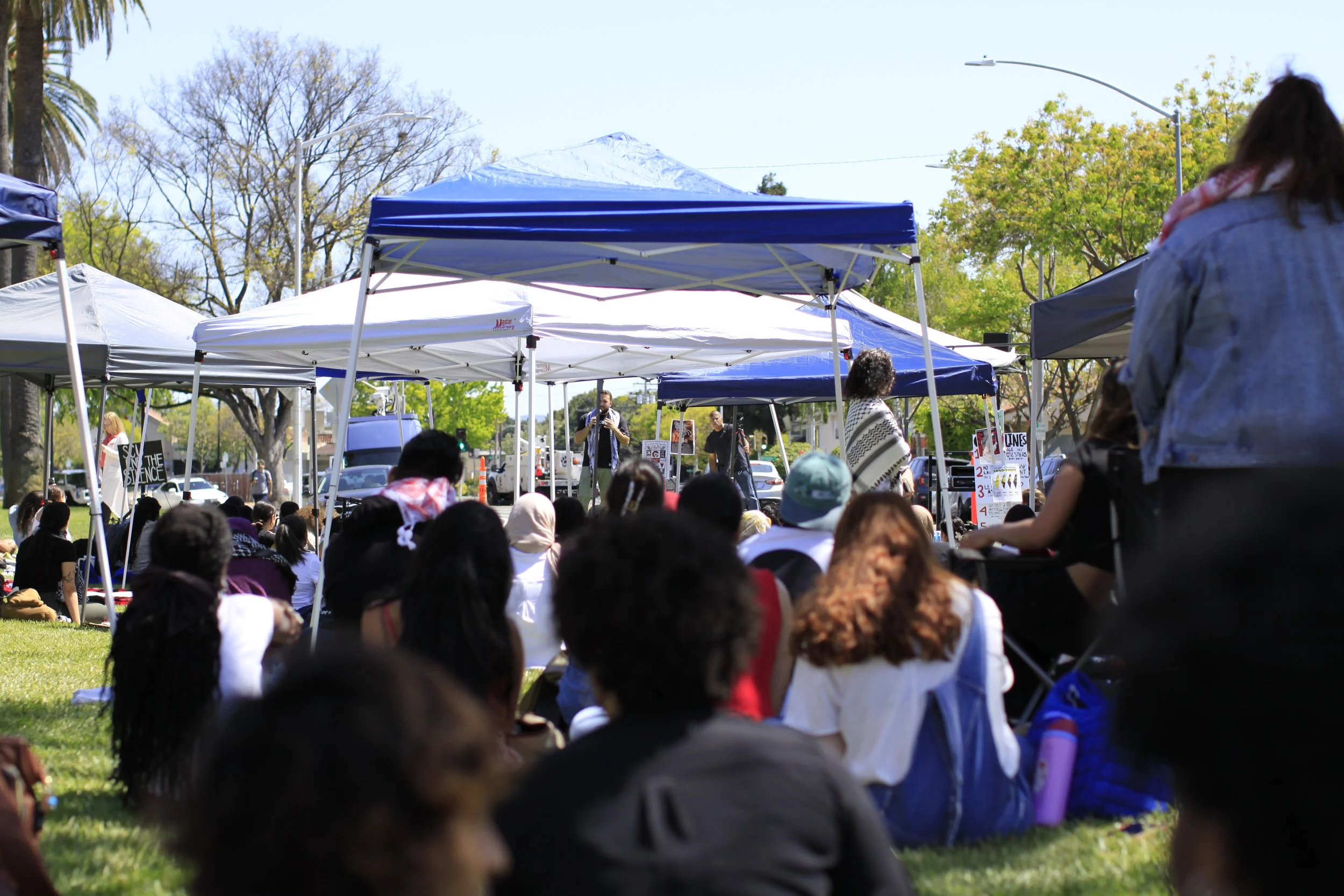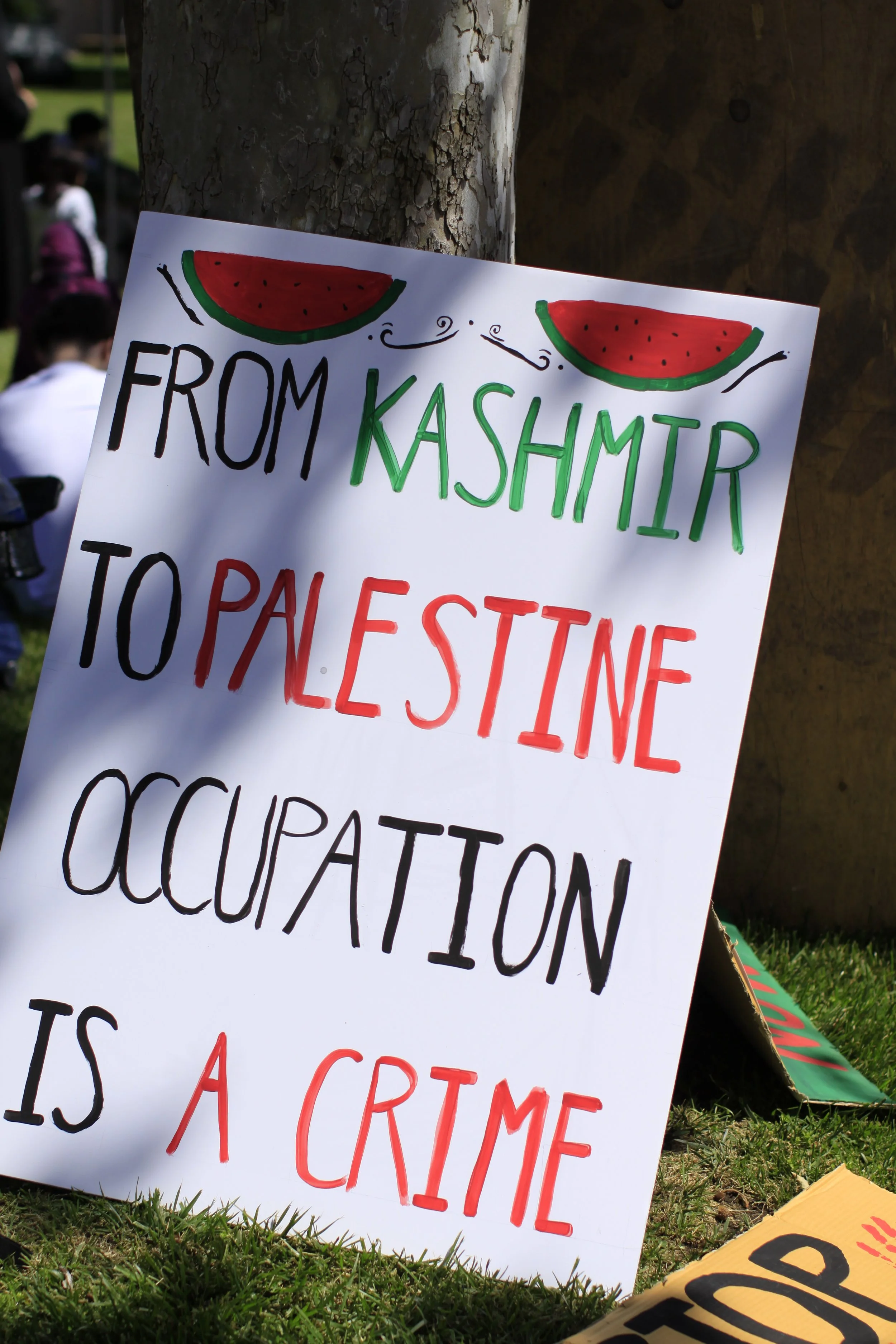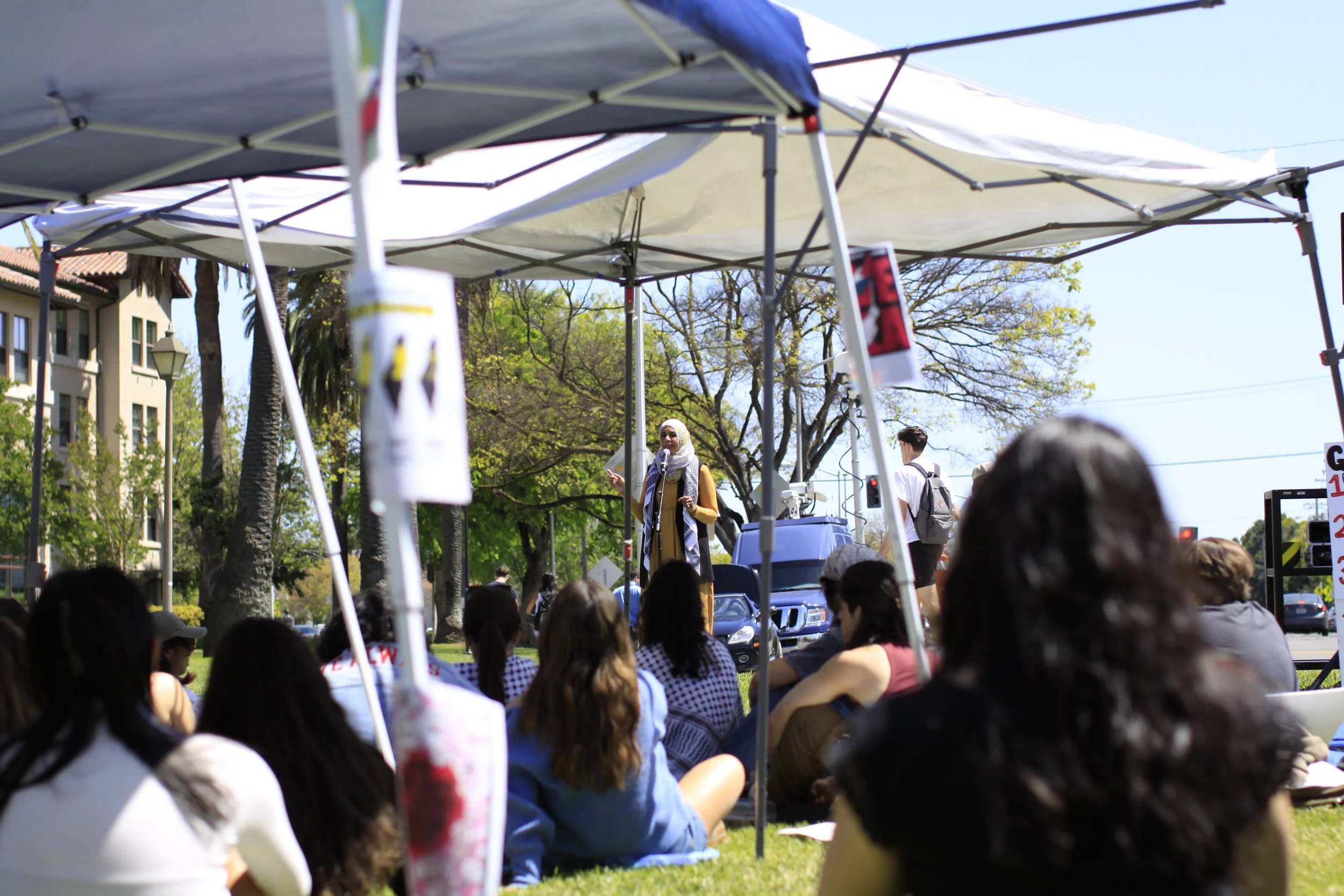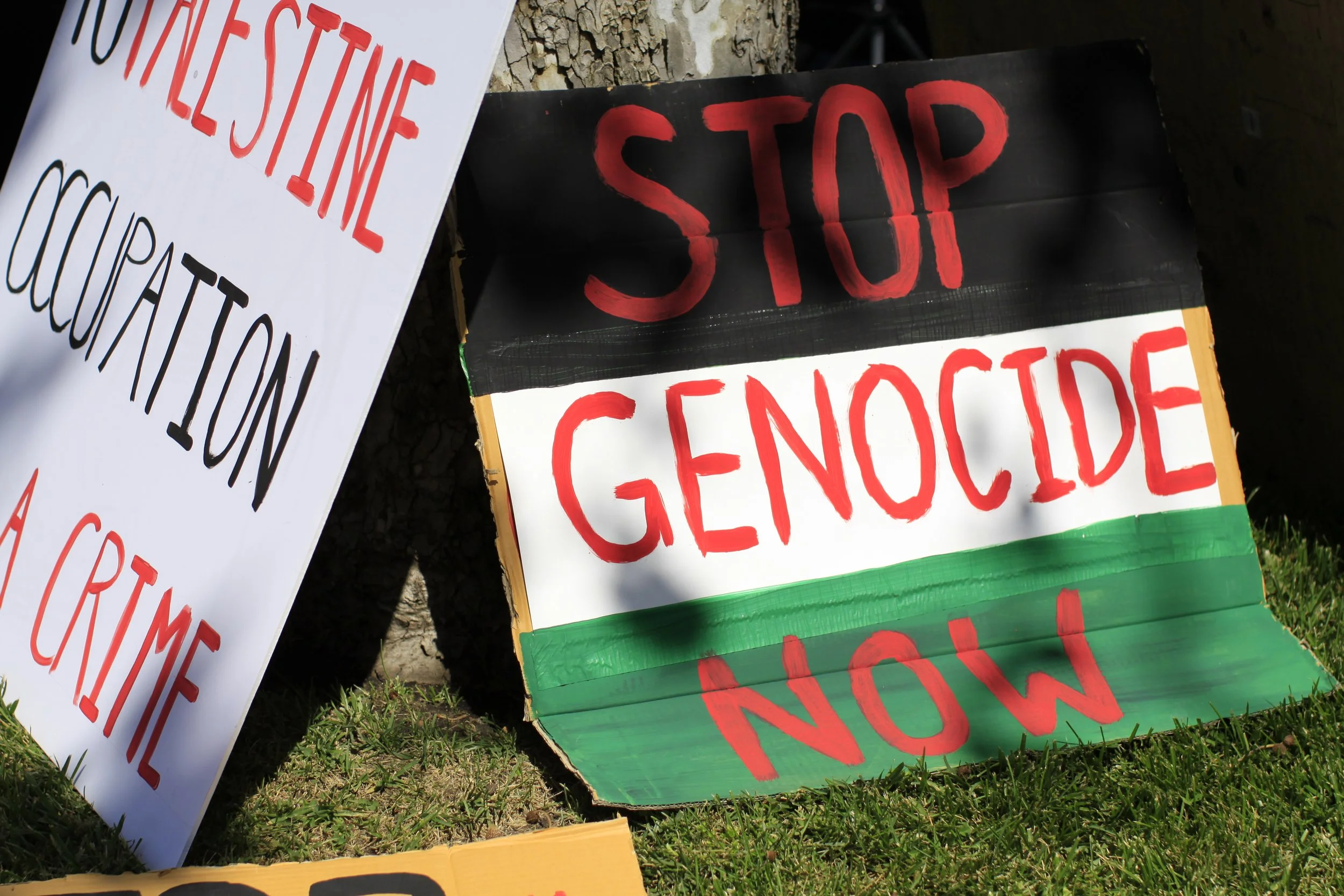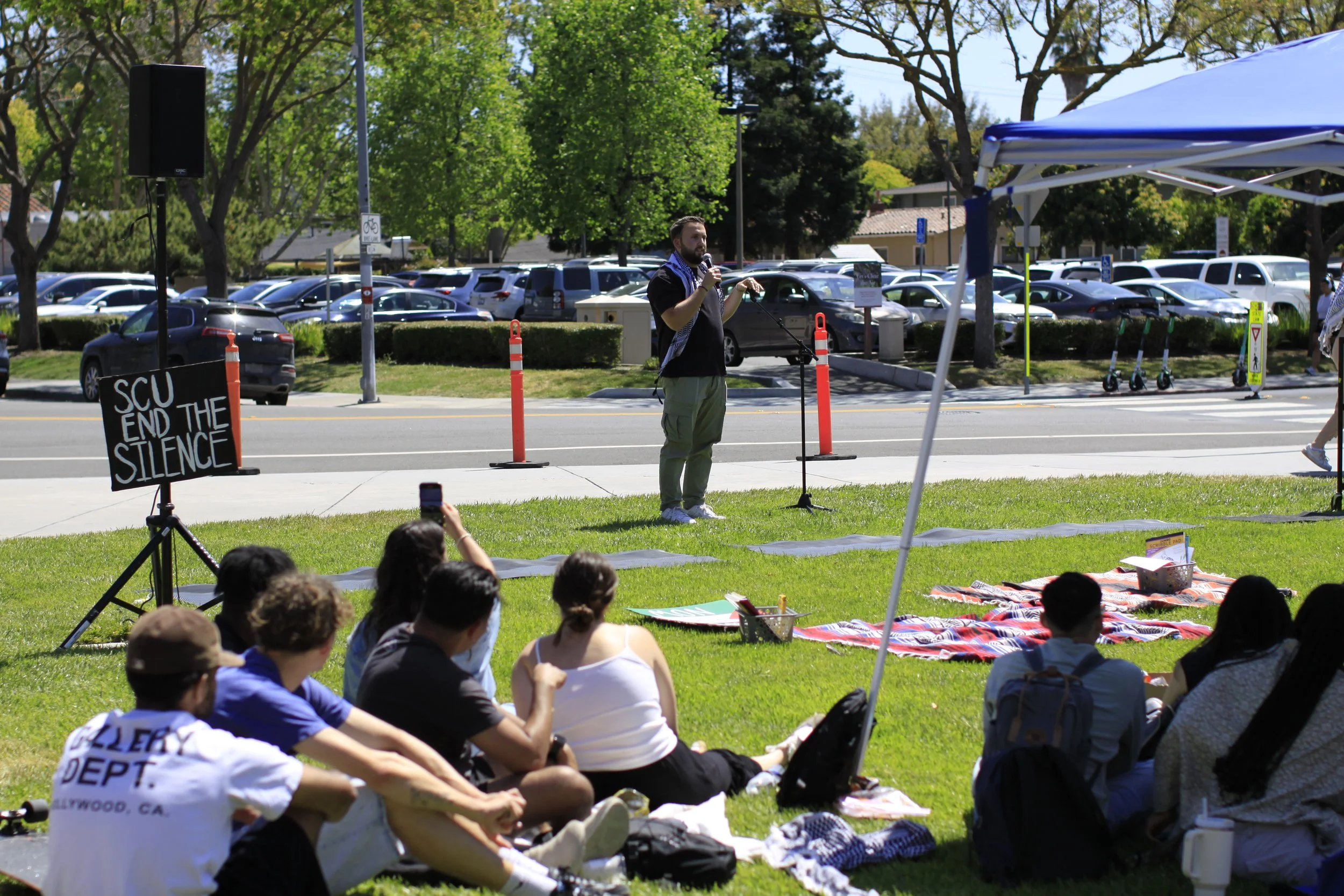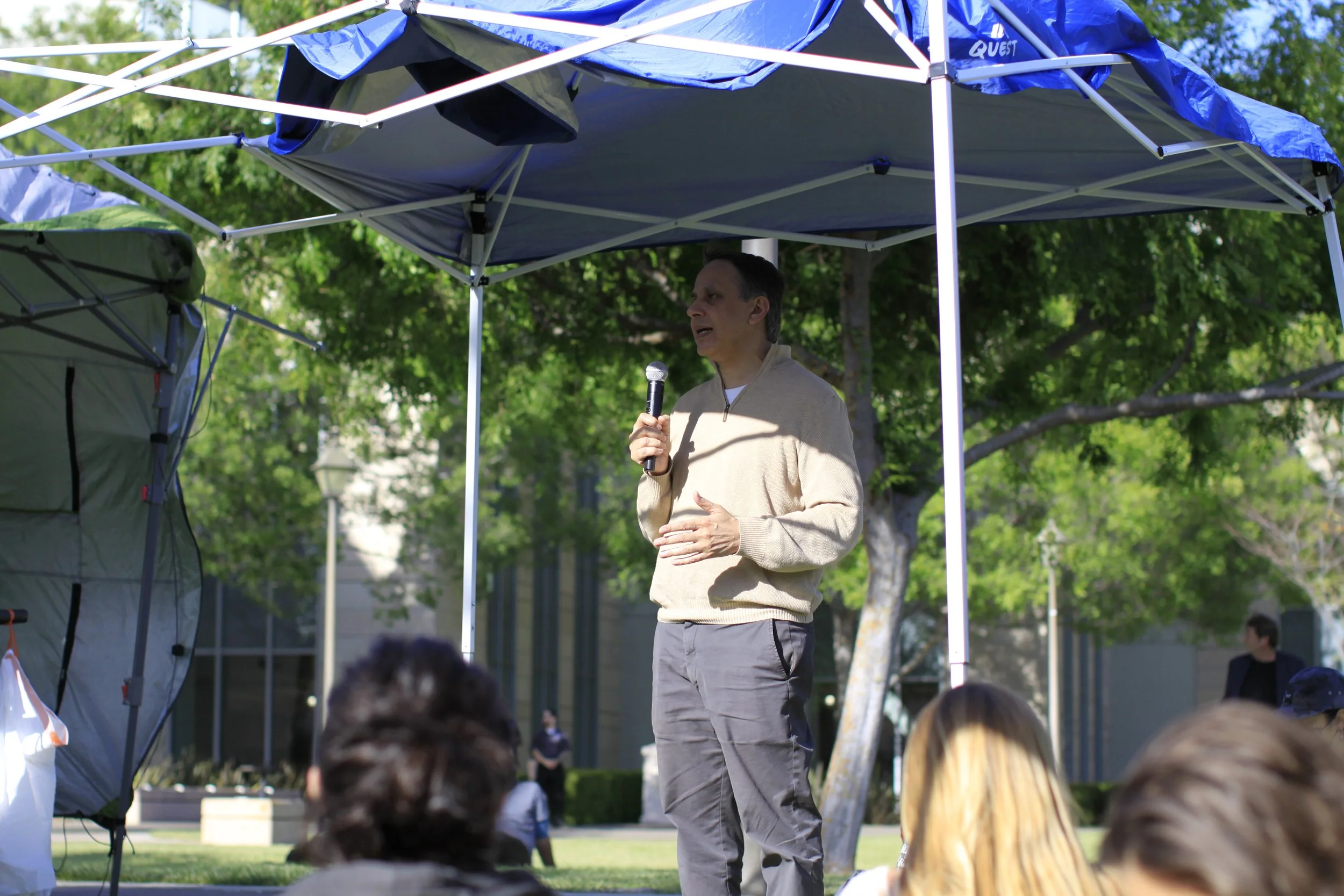Students Host Eight-Hour Teach-In for Palestine
Photos courtesy of Isa Montes
Over the course of eight hours, hundreds of faculty, staff and students spread out on blankets across Alameda Lawn, many wearing keffiyehs, reading, working and talking with the people around them in the shade of pop-up canopies. Prayers, poetry readings, impassioned speakers and a live oud performance captured the audience’s attention, as well as that of the many students passing the lawn on their way to and from classes.
A coalition of student organizations, students and faculty hosted a teach-in in support of Palestine from 12 p.m. to 8 p.m. on Wed., May 1, amidst nationwide campus demonstrations. The teach-in focused on making education, solidarity and conversation visible among the Santa Clara community regarding the crisis in Gaza.
“In order to have a mobilized base, you want an educated base,” said senior Daniel Martinez, Undocumented Students and Allies Association board member and one of the event’s student organizers. “Our intention here is to shine a light on what's going on in Palestine. We've been peaceful, and that is the intention, because we have a beautiful campus community, and through education we can engage them in the most authentic way that we know how.”
“I want students to be a part of the conversation,” said Palestinian-American junior Sarah El Qadah, co-president of the Middle Eastern North African Association, an Associated Student Government senator and another of the event’s organizers. “I want them to continue speaking about it and to feel as though it's not too late for them to learn and get educated on this topic, because it never will be.”
Photo courtesy of Isa Montes
Over 30,000 Palestinians have been killed in Gaza since Oct. 7, spurring student protests across the country demanding their universities disclose their investments and divest from companies supporting or profiting from Israel’s role in the violence.
“One of the biggest things is, when we are on this campus, taking an active role in finding out what companies Santa Clara is actively invested in,” said senior Tanvi Syed, the director of the Multicultural Center and an organizer of the event.
The backdrop to the event was a large wooden board listing the organizers' demands. It listed three demands: to “disclose & divest” and for a ceasefire statement from the university. The student body has demonstrated interest in disclosure and divestment in the past but has not seen any impact on Santa Clara policy or action, according to the organizers.
“In 2021, there was a letter that was passed by the Associated Student Government (ASG) that showed that Santa Clara is clearly invested in many companies that support Israel and profit off of and aid this genocide,” said senior Suzan Amiri, co-president of the Middle Eastern North African student organization. “But even though that letter was passed, pressure wasn't put on the university. I do think that disclosure of their investments will show if that pressure at all translated. If it didn't, then we want them to move forward with divesting.”
“It's been two years,” said El Qadah. “We have yet to hear back.”
Investment Director Frank Tessier declined to comment on behalf of the Santa Clara Investment Office.
The May 20, 2021 ASG resolution, titled “Resolution in Solidarity with Palestinians,” read, “Santa Clara University has a responsibility to ensure that its endowment is not invested in companies which profit off of human rights violations, a measure which SCU took in April 1986 by divesting from IBM for its role in upholding Apartheid in South Africa.”
“We invest the money donors have given us to maximize return, support student scholarships, support faculty research and chairs and programs,” said President Julie Sullivan, who attended the teach-in to observe from the sidewalk. “The fiduciary duty we have to those investors is to invest this money to achieve the greatest long-run risk-adjusted return. We do have a socially responsible investing policy, but it does not deal with any foreign policy issues or any political issues.”
The organizers, as well as many students in attendance, said an unwillingness to divest is in opposition to Jesuit values of peace and social responsibility.
“If it's a company like Lockheed Martin, which is actively supplying firearms and ammunition to the Israeli occupation forces, or if it's Boeing, which is supplying all of the aircraft or if it's McDonald's, supplying food to fuel the occupation forces to completely obliterate and murder thousands and thousands of people, including children and women, that’s just horrifying,” said Syed. “Divesting from these is the bare minimum. Unfortunately, this country only ever reacts to economic blocs.”
“Frankly, we are disappointed in Santa Clara,” said junior Imaan Qureshi, president of the Muslim Student Association, during her speech in the evening. “It’s disappointing that students must come together to tell our university leaders what’s right. We uphold the Jesuit values that this institution claims to embody when we speak out against violence and injustice. Because speaking out should not be conditional, Jesuit values should not be circumstantial.”
Sullivan said she had not been made aware of the student demand to release a ceasefire statement.
“I take a stand on peace,” she said. “I would support a ceasefire. And I take a stand on humanitarian aid for all people who are seeking aid. And I think I can do that and represent the divergent views in our university.”
Information about the teach-in was initially spread via an April 30 Instagram post from the account @scusjp, which belongs to the formerly registered student organization Students for Justice in Palestine Santa Clara University.
At 10:54 p.m. on Tues., April 30, Sullivan sent an email to Santa Clara students, faculty and staff preempting the event, writing, “As an educational institution, Santa Clara University respects and supports the rights of all members of our campus community to gather to express their viewpoints and deeply held concerns. We also are committed to ensuring the safety of all on our campus.”
Four minutes earlier, senior Lily Guggenheim, former president of the Jewish Student Union, sent an email addressed to “Jewish students, parents, staff, and faculty” with the subject line “Anti-Israel Protest on Campus 5/1.”
“The administration is not in support of this protest,” the email read. “They will do everything they can to protect the safety of students and keep the peace on campus … Admin and Campus Safety have several plans and protocols in place in case anything goes wrong. They are unable to share most of them with us as it could result in the plans being ineffective if they got out.”
Police have arrested or detained over 1900 university demonstrators at protests across the country as students and other university affiliates occupy buildings and establish encampments on their campuses nationwide.
“Because of what's going on at other campuses and one of the pieces of advice we've been getting from our colleagues is things could turn really quickly,” said Jeanne Rosenberger, Vice Provost for Student Life. “I think they wanted to be here and aware as opposed to waiting for somebody to call them.”
Campus Safety Services declined to comment.
No law enforcement was present at the teach-in.
“The violence happening on other campuses really emerges from the counter protests,” said Qureshi. “None of our protests or teach-ins aim for violence, but rather education, advocacy, doing the right thing and asking universities to do the right thing.”
At around 12 p.m. a man stood outside the Mission Church yelling that he would “sue the school if they come against Israel.'' Later in the day a small group of people wearing Israeli flags stood a few feet away from the teach-in, occasionally approaching students before leaving around 4 p.m.
It is unclear whether the counterprotesters were affiliated with Santa Clara. None were members of the Jewish Student Union, according to Guggenheim.
“It's a lot better than what we were preparing for,” she said. “I'm thrilled that it's been so peaceful and just grounded in storytelling and empathy and feeling. I think that's what it should be.”
The teach-in was organized with support from many Santa Clara student groups, including the Middle Eastern North African Association, the Muslim Student Association, the Multicultural Center and Students for Justice in Palestine.
“They were able to co-sponsor the event to not put one specific student in charge, which was really helpful,” said El Qadah.
The event organizers were in communication with administration and faculty throughout the planning and actualization of the event. The majority of the food and water provided to students was supplied by faculty in support of the teach-in, and Alameda Lawn was reserved for the protest by a faculty member.
Academic departments, including the Anthropology Department, the Women & Gender Studies Department, the Arabic Program and the Sociology Department sponsored the event.
“It is student-organized, but very much backed and supported by faculty,” said El Qadah. “And that was done for our safety as well.”
Members of Santa Clara faculty and administration were present at the event, most standing and observing from the perimeter. Some professors joined the crowd to sit on the lawn and converse with students.
“From my perspective, it's going very well,” said Rosenberger, who was among the onlookers. “We have met with the faculty and student organizers to hear what their goals are for the event and to create an environment where those goals can be met, and at the same time provide the opportunity to keep the campus safe, given everything that's going on around the country.”
Associate Professor of Political Science Farid Senzai, who specializes in Middle Eastern politics, was among those who spoke at the teach-in, providing historical context for the decades of history of the Israel/Gaza crisis, discussing current violence, showing support for students and bringing visibility to the crisis via demonstrations at Santa Clara and nationwide.
Photo courtesy of Isa Montes
Faculty involvement has been a contentious issue with demonstrations held at other universities, with some professors arrested or fired for participating or expressing support for students.
“My only problem with any kind of limits is that faculty have free speech, just like we all do,” Sullivan said. “But they should promote dialogue in class that welcomes students to express opinions, whatever those opinions may be. I feel like their personal activism probably should not be a part of that.”
Senzai has presented at other events on campus about the history of the Israel/Gaza crisis. None have been so visible to the student body.
“For 25 years, I've been dealing with this, hoping to educate about it,” he said during his portion of the teach-in. “And honestly, while there are some people who've been interested in the topic, the majority of America has not really been interested in this topic. The fact that you are here, interested, wanting to know about this is a testament to the fact that this moment is different. It's a moment we should all reflect on. It's a moment that all of you will remember years from now.”
Creating a publicly visible event was one of the primary goals of the teach-in, compared to indoor panels and presentations, including those involving Senzai, according to organizers.
“It's the beginning of something,” said El Qadah. “At the very least, this event is going to break the silence and push students and faculty that were uncomfortable talking about this issue to go on and talk about it in class, talk about it at lunch, breaking that silence. It's a little bit disappointing that we're six months in and we're breaking the silence right now. But everyone moves at their own pace and I guess we're starting here.”
Reporters were present from local television news stations KRON4 around 12 p.m. and Fox KTVU around 5 p.m., filming the teach-in and interviewing event organizers.
Syed and Martinez were two of the students interviewed.
“A lot of the questions were centered around the peaceful, educational part of this event contrasting the really harsh things that are going on at the other 120 plus universities that currently have set up encampments, and that rubbed me the wrong way,” said Martinez. “As Santa Clara students, we are doing what we know has worked historically on our campus. At these larger institutions, there is a larger mobile base. We're all just trying our best to take the spotlight away from us and shine it back to Palestine.”
“Currently, the media is completely villainizing what is happening in other schools and it's just ridiculous,” said Syed. “These are students of the next generation who have been trained to resist, have been trained to support liberation, have been trained to study movements and how history has always taken the side of those who have been oppressed.”
